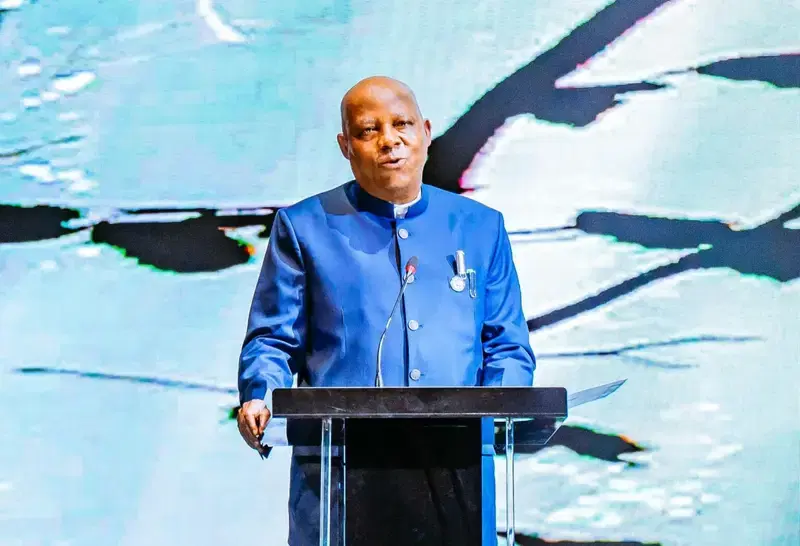The Federal Government has concluded plans to invest 220 million dollars in creating employment opportunities for young Nigerians.
Vice-President Kashim Shettima said this on Wednesday while inaugurating the Nigeria Jubilee Fellows Programme (NJFP) 2.0 at the Presidential Villa, Abuja.
The initiative is to be spearheaded in collaboration with the European Union (EU) and United Nations Development Programme (UNDP) through the second phase of the NJFP 2.0.
It aimed at connecting high-potential graduates with real-world work experience, training, and mentorship.
Shettima said the goal was to bridge the transition gap between learning and earning for thousands of young Nigerians – graduates who have the education but not always the opportunity.
This, according to him, will translate the nation’s demographic strength “into productive economic power”.
He said the administration of President Bola Tinubu is determined to deepen the ownership by embedding the programme into the government’s national planning and budgeting frameworks.
“This government will do its part—by ensuring that our financial commitment to the programme reflects our belief in its transformative potential.
“But national ownership must also mean national participation, as we launch NJFP 2.0 today.
” I call on our partners—from the private sector, the development community, and the donor ecosystem—to join us in building the NJFP Basket Fund, a sustainable financing mechanism to secure the programme’s future.
“Our immediate goal is to raise $220 million, not as charity, but as an investment in the nation’s most valuable asset: our young people.”
Shettima implored the EU, the UNDP and other partners to consider the flag-off of the programme as an opportunity to prove that “youth employment is not just a policy priority but a shared responsibility.”
He observed that when resources are pooled and intentions are aligned in the course of building together, a multiplier effect is created that benefits the nation’s economy.
The Vice-President acknowledged the contributions of the EU and the UNDP, noting that their belief in Nigeria’s youth has demonstrated what could be achieved through collaboration.
He said it was now time for Nigeria, through its public institutions, private sector champions, and philanthropic community, to lead from the front, even as he maintained that inclusivity is key to driving the process.
His words: “As we scale NJFP 2.0, inclusivity remains at the heart of our design. We recognise that our young people are not a single story. They live in different realities, across regions, genders, and social backgrounds.
“Therefore, this next phase will intentionally reach every corner of the country, aligning placements with the sectors that will define our economic future: agriculture, renewable energy, digital technology, manufacturing, and the creative industries.”
Shettima expressed hope that the second phase of the NJFP would turn out to be a success story “of how Nigeria turned its demographic advantage into a generation of productive citizens.
” It will be creating jobs, building enterprises, and shaping the future of our great nation. The task before us is both serious and inspiring.
” The young Nigerians we seek to serve are not asking for handouts—only for a fair system that recognises effort, rewards merit, and provides opportunity.
”They are ready to build if we are ready to back them,” he added.
The Minister of Youth Development, Ayodele Olawande, described the NJFP 2.0 as a continuation of the Federal Government’s success in youth empowerment.
He noted that since the programme began in 2021, it has helped over 13,000 youths to gain skills.
The minister assured that the initiative will build on its progress and achieve its long-term goal of placing 100,000 youths in jobs within five years.
The Resident Representative of the United Nations Development Programme (UNDP) in Nigeria, Ms Elsie Attafuah, said the generous funding from the EU and implementation support from the UNDP, over the years, are aimed at connecting potential to opportunity.
She noted that the vision behind the NJFP has come to light, resulting in over 40,000 Nigerians being placed in various economic sectors.
She stressed that millions of Nigerians need the NJFP platform to thrive in today’s economy.
The European Union Ambassador to Nigeria, Gauthier Mignot, said the EU was looking forward to seeing the NJFP 2.0 programme integrated into Nigeria’s governance agenda to ensure its sustainability. (NAN)
The post FG to invest $220m on job creation – Shettima appeared first on Vanguard News.

